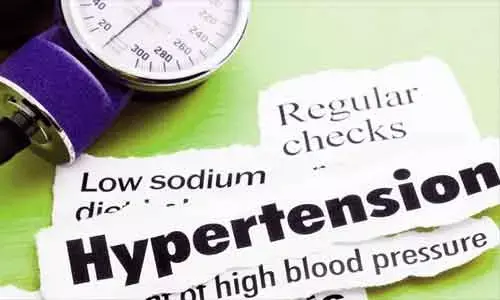- Home
- Medical news & Guidelines
- Anesthesiology
- Cardiology and CTVS
- Critical Care
- Dentistry
- Dermatology
- Diabetes and Endocrinology
- ENT
- Gastroenterology
- Medicine
- Nephrology
- Neurology
- Obstretics-Gynaecology
- Oncology
- Ophthalmology
- Orthopaedics
- Pediatrics-Neonatology
- Psychiatry
- Pulmonology
- Radiology
- Surgery
- Urology
- Laboratory Medicine
- Diet
- Nursing
- Paramedical
- Physiotherapy
- Health news
- Fact Check
- Bone Health Fact Check
- Brain Health Fact Check
- Cancer Related Fact Check
- Child Care Fact Check
- Dental and oral health fact check
- Diabetes and metabolic health fact check
- Diet and Nutrition Fact Check
- Eye and ENT Care Fact Check
- Fitness fact check
- Gut health fact check
- Heart health fact check
- Kidney health fact check
- Medical education fact check
- Men's health fact check
- Respiratory fact check
- Skin and hair care fact check
- Vaccine and Immunization fact check
- Women's health fact check
- AYUSH
- State News
- Andaman and Nicobar Islands
- Andhra Pradesh
- Arunachal Pradesh
- Assam
- Bihar
- Chandigarh
- Chattisgarh
- Dadra and Nagar Haveli
- Daman and Diu
- Delhi
- Goa
- Gujarat
- Haryana
- Himachal Pradesh
- Jammu & Kashmir
- Jharkhand
- Karnataka
- Kerala
- Ladakh
- Lakshadweep
- Madhya Pradesh
- Maharashtra
- Manipur
- Meghalaya
- Mizoram
- Nagaland
- Odisha
- Puducherry
- Punjab
- Rajasthan
- Sikkim
- Tamil Nadu
- Telangana
- Tripura
- Uttar Pradesh
- Uttrakhand
- West Bengal
- Medical Education
- Industry
Moringa oleifera leaf extract may lower blood pressure in high BP patients: study

Researchers have found that there is evidence that Moringa oleifera leaf aqueous extract is beneficial in high blood pressure (high BP) in both experimental animals and clinical studies.The Study has appeared in the journal Biomedicine & Pharmacotherapy.
High blood pressure is a major risk factor for future cardiovascular events such as myocardial infarction and stroke, which is often accompanied by the augmented constriction of resistance arteries and arterioles.
Moringa oleifera is a large tree native to North India known by a variety of names, such as drumstick tree, horseradish tree or ben oil tree.
Moringa oleifera has been praised for its health benefits for thousands of years.Its leaves are used as vegetables and for traditional herbal medicine.
Direk Aekthammarat et. al. attached to the Department of Basic Medical Science, Faculty of Medicine Vajira Hospital, Thailand have reported that moringa olifera extract (MOE) lowers arterial blood pressure through inducing relaxation of small resistance artery mainly via activating the eNOS-NO-sGC pathway.
Previous evidence has already identified the promoting of nitric oxide (NO) production in endothelial cells using natural products as a potential strategy to prevent and treat hypertension.
Moringa oleifera Lam (Moringaceae) is a tropical plant widely used as food and in traditional medicines. Though recent reports have validated that oral administration of aqueous extract of Moringa leaves (MOE) to rats was effective prevention against the oxidative stress-related hypertension, by alleviating endothelial dysfunction and hyperactive vasoconstriction and MOE has exhibited excellent endothelium-dependent relaxation in the hypertensive resistance artery but, the effect of MOE on endothelial NO production about the blood pressure (BP) reduction remains unclear.
Researchers carried out the study in male Wistar rats (6 weeks old). An aqueous extract of M. oleifera leaves (MOE) was prepared. In vivo blood pressure measurement in anesthetized rats was done after applying the MOE.
The highlighted facts obtained from the study are –
The blood pressure-lowering effect of MOE is associated with the relaxation of the small resistance artery.
•The blood pressure-lowering and vasorelaxant effects induced by MOE are partially dependent on the (eNOS) function.
•MOE induces endothelium-dependent relaxation through the eNOS/sGC pathway.
•MOE increases NO production in human pulmonary artery endothelial cells.
•The vascular effect of MOE is also unrelated to prostacyclin synthesis.
Authors believed that the vasodilation and blood pressure lowering effects of MOE arise from the increased NO production by endothelial NOS. It is usually difficult to inject traditional medicine with complicated components into the human body. Therefore these leaf extracts can be a relatively safe alternative approach for hypertensives.
"Whether MOE has effects on other endothelial cells and its efficacy in humans require more studies." authors wrote.
Primary source: Biomedicine & Pharmacotherapy
For a detailed reading click on the link: https://doi.org/10.1016/j.biopha.2020.110605
Dr Satabdi Saha (BDS, MDS) is a practicing pediatric dentist with a keen interest in new medical researches and updates. She has completed her BDS from North Bengal Dental College ,Darjeeling. Then she went on to secure an ALL INDIA NEET PG rank and completed her MDS from the first dental college in the country – Dr R. Ahmed Dental College and Hospital. She is currently attached to The Marwari Relief Society Hospital as a consultant along with private practice of 2 years. She has published scientific papers in national and international journals. Her strong passion of sharing knowledge with the medical fraternity has motivated her to be a part of Medical Dialogues.
Dr Kamal Kant Kohli-MBBS, DTCD- a chest specialist with more than 30 years of practice and a flair for writing clinical articles, Dr Kamal Kant Kohli joined Medical Dialogues as a Chief Editor of Medical News. Besides writing articles, as an editor, he proofreads and verifies all the medical content published on Medical Dialogues including those coming from journals, studies,medical conferences,guidelines etc. Email: drkohli@medicaldialogues.in. Contact no. 011-43720751


